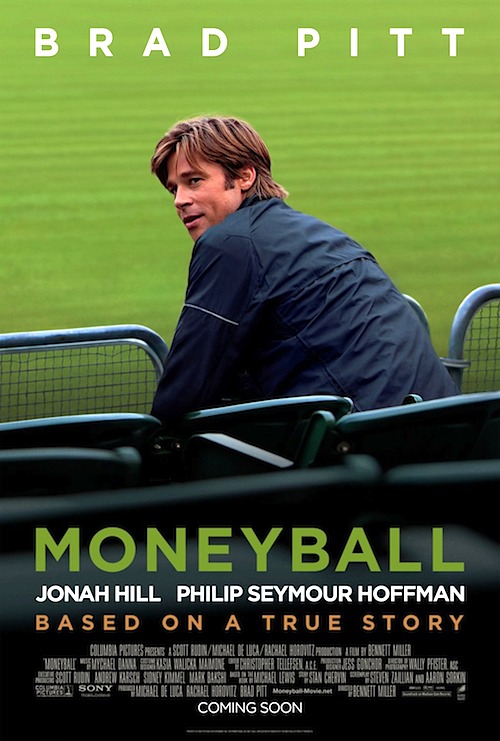 By Joe Bendel. In the dead of December, New York sports fans turn their attention to Major League Baseball’s Winter Meetings. Of course, Yankee fans are always hoping their well-heeled team pulls off a blockbuster deal. Yet the business side of baseball holds a fascination even for fans of so-called ‘small market’ teams. Oakland A’s General Manager Billy Beane tried to radically alter the business operations of shallow-pocketed teams. His somewhat successful efforts spawned a host of imitators, a nonfiction bestseller from Michael “Liar’s Poker” Lewis, and a subsequent, long-in-development Hollywood adaptation, Bennett Miller’s Moneyball, which opens today nationwide.
By Joe Bendel. In the dead of December, New York sports fans turn their attention to Major League Baseball’s Winter Meetings. Of course, Yankee fans are always hoping their well-heeled team pulls off a blockbuster deal. Yet the business side of baseball holds a fascination even for fans of so-called ‘small market’ teams. Oakland A’s General Manager Billy Beane tried to radically alter the business operations of shallow-pocketed teams. His somewhat successful efforts spawned a host of imitators, a nonfiction bestseller from Michael “Liar’s Poker” Lewis, and a subsequent, long-in-development Hollywood adaptation, Bennett Miller’s Moneyball, which opens today nationwide.
As a teenager, Beane was recruited hard by MLB scouts. Foregoing a full-ride Stanford scholarship, Beane pursued glory on the baseball diamond and failed badly, scratching out a front office management career instead. As Moneyball opens, his team has just been knocked out of the post-season by the dreaded Yankees and is about to be gutted by free agency. With an owner unwilling to pony up the big bucks, Beane spurns the star system of free agency, using unconventional methods to select players.
With the help of his Ivy-League educated numbers cruncher, Beane signs statistically under-valued players, placing greater emphasis on on-base-percentage than sexier stats like home runs or stolen bases. This produces a roster full of players considered rejects by the sports media, because they mostly were. They were cheap, though, and could fulfill their specific roles.
Not surprisingly for a film co-written by Aaron Sorkin, Moneyball takes a few liberties with the historical record, ignoring the fact that Beane’s predecessor (and current Mets GM) Sandy Alderson initiated the team’s “sabermetric” approach. Unfortunately, Alderson looks nothing like Brad Pitt, so that’s Hollywood for you. Using the Yankees as a symbol of large market imperialism is also getting to be a tired cliché, especially considering many of the players on their late 1990’s championship teams were farm system products.

However, for some baseball commentators, Moneyball’s depiction of A’s skipper Art Howe might prove to be the most controversial aspect of the film. As portrayed with icy reserve by Philip Seymour Hoffman, Howe appears to deliberately sabotage Beane’s attempts to reconfigure the team, but is only too happy to take the credit in the media when Beane’s efforts bear fruit. In fact, it seems as if Beane even does more nut-and-bolts coaching than Howe at the player level. Mets fans still trying to forget Howe’s disastrous two-year stint at the old Shea will probably have no trouble buying into that.
Regardless, for those who do not know or care who made the last out of the 2001 ALCS and for baseball fans willing to allow for a bit of license, Moneyball is an engaging trip to the ballpark. The dialogue is sharp and snappy, which is impressive considering how much of it revolves around statistics. Whether truly accurate or not, its depiction of front office wheeling and dealing is also pretty entertaining.
Pitt certainly cranks up his star-power likability, but he also conveys a fair amount of grit as the sometimes mercurial GM. He develops a nice bantering rhythm with Jonah Hill, who is surprisingly grounded and convincing as his sabermetric lieutenant, Peter Brand, a fictionalized version of assistant GM Paul DePodesta. He also has some reasonably endearing chemistry with young Kerris Dorsey playing Beane’s daughter Casey. Indeed, it is a relationship just real enough to be humanizing, while sparing us any extraneous melodrama. Rest assured, there will be no home runs dedicated to her while she recuperates in the hospital. (Beane’s players are supposed to walk, anyway.)
Even though there is very little in-game action, Moneyball is a very good baseball movie. In a way, it’s paced much like the game itself. The faithful can get caught up scoring every pitch, while casual viewers can step out for a hotdog and easily pick up the narrative thread when they return. One of the smarter sports films of recent vintage that still wears its heart for the game on its sleeve, Moneyball opens nationwide today (9/23), including in small markets.
Posted on September 23rd, 2011 at 3:38pm.
Being a lifelong Reds fan, I can certainly admire some of Moneyball’s ideas, so I’ll probably find that part of the movie endearing. But the idea that scouts are useless and a spreadsheet can determine a player’s usefulness in the organization will probably grate on me, especially considering the A’s began to place their emphasis back on scouts. Either way, it does look and sound like a good movie, so I’ll be there.
Great article, Joe. The Yankee-bashing has never been based on any intellectual argument.
Billy Beane gets way too much credit — his teams have had some of the worst records in the league. And his success doesn’t seem to be because of so-called Moneyball. Sluggers like Jason Giambi, Miguel Tejada, and Eric Chavez didn’t seem to rely on walks for their production. And it didn’t hurt to have lock-down arms like Barry Zito, Tim Hudson, and Mark Mulder.
This just seems like an odd choice for a baseball film. There’s so many other stories to be told. I read a Red Sox book called “The Teammates” which was incredible. The book would jump onto the screen.